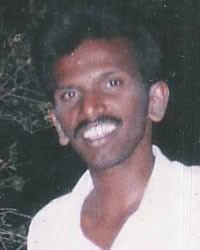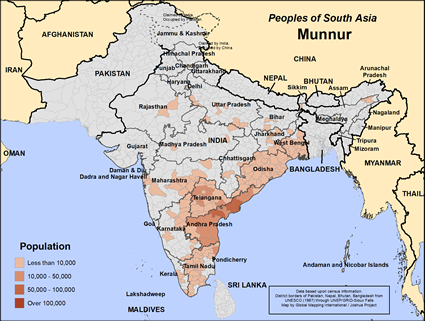The Munnur or Munnuru Kapu have tilled the soil of south India for hundreds of years. They prefer to be called Munnurukapu. Their name means 300. A past king of Hyderabad called for 300 soldiers of this people group to act as his personal bodyguards. In times of war the Munnur served as soldiers and officers in the armies of the dynasties of Andhra Pradesh. In times of peace they went back to the traditional occupation of farming.
The Munnur are considered a “backward” caste. They are entitled to special benefits such as guaranteed spots in universities and public jobs. Most Munnur live in the southwest Indian states of Andhra Pradesh and Telangana. Their primary language is Telugu, the primary language of these two states.
They are farmers who also raise animals for dairy products and for sale but many own their own land. Others work as laborers on land owned by others. Their two main crops are rice and wheat. They also grow vegetables and fruits to supplement their diet and to sell to others. The lives of the Munnur revolved around the wet and dry seasons of the subcontinent and around the holidays of the Hindu calendar.
Some women work as domestics of richer Indian households. Some of the young men join the Indian Army and send money home to support their families in the village.
The Munnur often engage in cross-cousin marriage. The young person marries a cousin, the son or daughter of the brother of their mother. Families arrange marriages. Weddings and other important life rituals are officiated by Brahmin priests or village priests. Child marriage was the ancient custom among the Munnur, but that is changing to adult marriage with consent from the young couple.
In times past many Munnur were illiterate. That is changing. Elementary schools are open the villages where the Munnur live today. Unfortunately, some of their children work in the fields with their parents and only receive a minimal education.
The Munnur people have gained some political clout in recent decades. Several from their community have been elected to the state government of Andhra Pradesh, and they have big plans for the 2028 election.
The Munnur practice Hinduism, the ancient religion and culture of Indian. They worship and serve the many gods of the Hindu pantheon. They worship Shiva and Vishnu as their primary deities. They offer flowers, food and incense at the gods' temples. The Munnur participate in the yearly Hindu festivals of Holi, the festival of colors, Diwali, the festival of lights and Navratri, the nine-day celebration of autumn.
The Munnur need to hear the life-changing gospel of Jesus Christ in a way they can understand. They also need help in their villages with educational, vocational and medical issues.
Pray the Lord sends Indian Christians to share the good news of Christ with the Munnur.
Pray that the Munnur would hear and respond positively to the claims of Christ.
Pray that God would move Christians workers would come to live in the villages of the Munnur and help meet their spiritual and physical needs.
Scripture Prayers for the Munnur in India.
munnurukapusociety.com/history/
munnurukapuresearchcenter.blogspot.com/2015/05/historical-and-socio-economic-profile.html
| Profile Source: Joshua Project |











